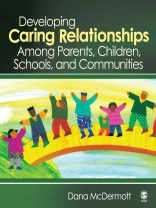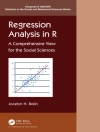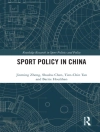‚This text provides a fresh look at an important topic—teachers and families working collaboratively. A strong blend of research and practical application is presented.‘
—Beth Nason Quick, Tennessee State University
‚I was captivated by an innovative and a gentle, humanistic approach to viewing families and working with parents in parenting education.‘
—Gloria Wenze, University of Scranton
‚A synthesis of theory, research, and practice couched in a very readable text… a provocative examination of teacher and parent relationships that holds the promise of a better future for the next generation of educators and parents. This book should fan the flames of professional reflection and professional practice.‘
—William Mc Inerney, University of Toledo
Developing Caring Relationships Among Parents, Children, Schools, and Communities looks at parent-professional-child relations very differently than other books in this area. Author Dana Mc Dermott focuses on parents and teachers as adult learners who should be growing and learning along with the children in their care. Accessibly written, the book synthesizes the latest theories and research on parent-and adult-child relations and on adult learning and development, focusing on a dynamic process rather than a static role and, on all the social-contextual factors affecting parents, teachers, and children.
Key Features
- Focuses on parents and teachers as adult learners: This will supplement traditional books on family involvement or parent child relations which rarely drill down to understand parents as anything more than a conduit to a child′s development.
- Emphasizes the dynamic process of parenting and teaching: The author provides a useful tool, or a caring decision-making process, for parents, children, and professionals to think through any issues they face so that everyone′s needs are considered in any interaction.
- Provides a theory to practice model to support parents, families, and teachers: This book lays out a theory of what parents and teachers need to care for children and themselves and then shows how to put these theories into practice in pre K—12 schools.
- Uses narratives to demonstrate applications of theory and research: The latest theories and research are woven into stories from the voices of parents, teachers, and children.
- Explores research from diverse cultures: The book looks at many schools around the world and from various socioeconomic backgrounds to identify their common and differentiated concerns.
- Includes additional web resources: Questionnaires, workshops, newsletters, model development information, resource material and other exemplary projects/resource sites can be found in the appendices.
Intended Audience
This supplemental text is designed for undergraduate and graduate courses such as Parents/Home-School Relations in Early Childhood and Elementary Education; Parenting; and School and Community Relations in departments of education, psychology, family studies, health sciences, and social work.
Inhaltsverzeichnis
List of Appendices
Preface
Acknowledgments
Introduction: Thinking Mindfully About Parents
Part I. Understanding Parents Within Their Cultural Context
1. Understanding Parent Involvement and Engagement in Schools Today
Framing the Issues
Traditional Definitions of Parent Involvement
Political, Philosophical, Social, and Cultural Issues
New Paradigms and New Solutions: Focus on Engagement
Summary
2. Understanding Theories and Research on Parenting
Early-20th-Century Theorists
The Interactionists
Trait Theorists
Bidirectional and Transactional Theories
Humanistic Theorists
Social-Cognitive Theories
Family Systems Theories
Social Relationships Theories
Bioecological Systems Theory
Family Support and Empowerment
Summary
3. Understanding the Elements of Parenting and Caring: Theories and Research
Defining Parents
A Case Study Illustrating What Parents Do
The Parenting Process: A Theoretical Framework
Research Demonstrates the Complexity of the Parenting Process
The Parenting Process and Parental Thinking
Parental ‚Ways of Knowing‘
Research on Parental Thinking
Exemplary Programs Support Parents as Lifelong Learners
Characteristics of Confident and Competent Parenting and Caring
Summary
4. Understanding Parents and Teachers as Lifelong Learners
Parents and Teachers Are Lifelong Learners
Case Studies Examining Parent and Teacher Learning Needs
Improving Parent-School Engagement and Learning
Connecting Adult Learning and Adult Development
Importance of Parent and Teacher Development
Parent-Teacher Learning and Development Collaborations
Summary
5. Understanding Culturally Diverse Parents and Teachers
What Is Cultural Context?
Terms and Questions That Aid Our Understanding
The Role of Stories in Cultural Identity
Some Questions Enhance Our Understanding of Parents
Parents′ Beliefs About Children′s Needs: Collective Versus Individual Focus
Parental Goals
Parents′ Thinking and Behaviors Toward the Child and Others
Parents′ Ideas About the Nature of Children
Parents′ Own Status and Context
Self-Efficacy, Socioeconomic Status, and Cultural Context
A Rationale for Using Questions to Understand Parents
Summary
Part II. From Theory to Practice: Fostering Caring and Culturally Sensitive Parent-Child-School-Community Relationships
6. Fostering Caring Ways of Relating
Adult Learning Principles Frame the Model
Meta-Parenting Is Another Helpful Construct
A Caring Model of Parenting and Relating
The Parenting-Caring Connection
Parenting-Caring and Adult Learning
Case Studies Exemplify the Caring Process
Generalization of the Parenting-Caring Model
Summary and Concluding Thoughts
7. Understanding Parents′ and Teachers′ Concerns
Concerns of Parents of Diverse Socioeconomic Backgrounds
Some Common Concerns
Parents′ Concerns by Age and Grade of Child
Control: A Common Concern for All Parents
Other Factors Related to Parental Control
Communication: Another Common Concern
Case Study: A Communication Solution
Communication and Explanatory Style
Communication With Parents, Teachers, and Schools
Communication Experts Listen to Parents
External Threats
Summary: Historical Consciousness
8. Providing Developmental Opportunities for Parents and Teachers
Needs of Adults Caring for Children
Parents and Teachers Seek Guidance and Support
Faculty Learn and Grow Together
Parents, Teachers, and Staff Grow and Learn Through the PEI
Reflection on Practice Benefits Everyone
Parent-Teacher Discussions Are Also Helpful
Stories as a Way That Adults in Children′s Lives Learn From Each Other
Other Models to Support Parent and Teacher Development
Summary and Concluding Thoughts
9. Ensuring That the Next Generation of Parents Is Prepared for Their Role
Background and Rationale
Parent-Infant Visits: A Powerful Teaching Tool
The Many Reasons for Teaching Parenting and Caring
Advocates for the Cause
What Children Learn in Parenting-Caring Classes
International Movement for Parenting in Schools
Teaching Parenting Throughout the School Years
Results Demonstrate Student Learning
Students Contribute Meaningfully to Their Community
Parenting Courses as a Requirement for High School Graduation
Summary
Epilogue
References
Index
About the Author
Über den Autor
Dana Mc Dermott is an assistant professor at the School for New Learning at De Paul University. She has worked for over two decades in the Chicago area, nationally and internationally in the area of parent and family development. In Chicago she has been involved in minority parent leadership and in implementing parent education programs for children in schools from K-12 and for their parents. She serves on two national boards: “Prepare Tomorrow’s Parents” an organization dedicated to promoting and supporting parenting education in schools and the National Parenting Education Network dedicated to supporting parenting educators in their work. She consults with schools and parent groups in the areas of parenting, teaching caring, social and emotional development of children and violence prevention. She is a member of the National and Illinois Councils on Family Relations.












